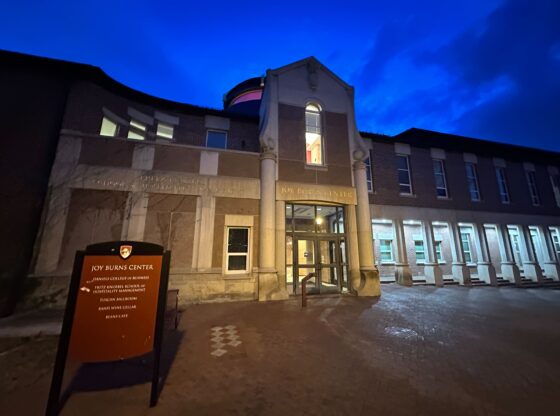As the Trump administration ramps up its dismantling of diversity, equity and inclusion (DEI) programs nationwide, some universities are pushing back. Harvard is fighting in court. Others are tightening their belts. And at the University of Denver, students are watching closely, wondering what the future holds for the programs that helped them feel seen in the first place.
On President Trump’s first day in office, he signed over 20 executive orders — including one that began the dismantling of federal DEI programs. The Trump administration proposed regulations aimed at defunding DEI offices, restricting race-conscious programming and penalizing institutions that do not comply.
On Monday, April 14, Harvard became the first U.S. institution to openly defy the Trump administration’s demands. Late Friday evening on April 11, the administration sent Harvard a letter entailing a list of demands that the university must abide by to receive federal funding. Demands included the closure of all DEI programs, restrictions on international student acceptances and federal oversight of admissions and the ideology of students and staff.
Harvard’s statement titled “Promise of American Higher Education,” published on April 14, condemns the administration’s demands and affirms the university’s stance on protecting the values of higher education in the U.S.
“The University will not surrender its independence or relinquish its constitutional rights… The administration’s prescription goes beyond the power of the federal government… it threatens our values as a private institution devoted to the pursuit, production, and dissemination of knowledge. No government — regardless of which party is in power — should dictate what private universities can teach, whom they can admit and hire, and which areas of study and inquiry they can pursue,” wrote Harvard President Alan Garber.
The public condemnation by Harvard was the start of an intense battle between the university and the Trump administration. Following the statement, the government froze over $2 billion in federal funding and threats to revoke Harvard’s tax-exempt status followed shortly after.
On Friday, April 18, The New York Times reported that Trump officials claimed the letter sent to Harvard on April 11 was a “mistake” and sent without authorization. Yet, the government has not withdrawn the letter.
Other elite universities have not taken similar approaches and instead have acceded to the demands imposed by the administration. Universities like Columbia have faced criticism for not taking a firmer stance against the administration after it was hit with a $400 million funding cut. Since Harvard’s statement, that has started to change with Columbia’s acting president, Claire Shipman, stating the university will not relinquish its independence.
At DU, administrators say they remain committed to supporting marginalized students, but acknowledge that the university must comply with evolving federal guidelines. For many in the DU community, this raises pressing questions about what compliance will mean and how much ground can be held.
During the National Day of Action for Higher Education programming on Thursday, April 17, led by the American Association of University Professors (AAUP) DU chapter, the attack on DEI and academic freedom was addressed. In a discussion led by professors, Dr. Cecilia Orphan, Dr. Dheepa Sundaram and Dr. Dakota Park-Ozee, they referred to the moment American society finds itself in as a “constitutional crisis.”
Concern over the political rollback of DEI initiatives, drawing parallels to past attacks on academic freedom and warning that recent actions threaten the core mission of higher education took center stage.
Dr. Orphan mentioned the resemblance to the McCarthy era, highlighting how that period tested universities’ willingness to defend their faculty and students when they were targeted for expressing opinions on U.S. involvement in the Cold War. All three professors emphasized that current challenges are not just about DEI terminology but represent broader threats to civil rights, equity and the role of universities in fostering inclusive, critical discourse.
“The use of the term DEI is masking an attack on civil rights and should concern every person on this campus and in this country,” said Dr. Sundaram.
In an email statement to the Clarion, Jon Stone, the Director of Media Relations at DU, stated, “While we must, of course, comply with federal laws, DU is dedicated to supporting all members of the institution’s population, including individuals identifying with historical experiences of exclusion. We are committed to fostering inclusion and a culture of belonging through initiatives and efforts addressing the unique needs of each student.”
Diversity, equity and inclusion were once emphasized as core values at DU. However, as of fall 2022, only 33% of students identified as racially diverse, while 65% identified as white, underscoring the continued need for intentional support and representation on campus.
In August 2020, DU launched the DEI Action Plan that intended to focus on five areas of impact — improving the way DEI is understood on campus, establishing a DEI committee to have accountability, investing in DEI training for the DU community, building support for the Black community on campus and launching “university-wide programming” on the term “antiracism.” The last update on the DEI Action Plan published on the DU website was on Sept. 18, 2020 from Chancellor Jeremy Haefner, who described the initiative as a “strategic framework.”
Over the years, DU has established several offices dedicated to advancing diversity, equity and inclusion across campus. Much of this work is led through the Student Affairs and Inclusive Excellence (SAIE) Office, which provides ongoing support and resources for students.
The Cultural Center further fosters community by supporting student affinity groups and organizing signature events like the Día de los Muertos celebration, Pride Prom and Lavender Graduation. The Cultural Center also provides spaces such as the BIPOC Affinity Lounge and the Pride Lounge, which serve as vital hubs where students can feel safe and supported while navigating life at a predominantly white institution.
Additionally, the First@DU Office, also housed within SAIE, focuses on supporting first-generation and immigrant students through specialized programming and resources designed to ease their transition and enhance their experience at DU.
Amy Cerna Sanchez, a first-generation third-year student majoring in psychology and business information and analytics, has received support from the First@DU Office throughout her time at DU. Her first interactions with the office occurred before Sanchez committed to DU, as the staff assisted her with missing financial aid requirements and explained the intricacies of her financial aid offer.
“They [First@DU] are a pillar to the DU community, and I truly believe that they play the biggest role in keeping students like myself here… To this day, they have provided a sense of community where I have met some of my closest friends and created meaningful bonds with the staff… With DU being a PWI, the imposter syndrome is always present. However, with this office, it makes that feeling a little smaller as I have people in my corner,” said Sanchez.
Like many students that have been impacted by the office, Sanchez has concerns regarding the future of her “home away from home.”
“My biggest concern is funding cuts or worst case scenario, the shut-down of the First@DU office. If this occurs, I truly could not imagine what that would mean to our community as so many students rely on these programs for support,” said Sanchez.
“The work of FIRST@DU remains an institutional priority and will continue to foster support and belonging for students to better prepare them to thrive in an ever-evolving and dynamically global society,” wrote Stone.
With the rollback of DEI policies, there are concerns about the future of these programs and the resources they have provided for students from historically marginalized communities.
“The University remains steadfast in its commitment to inclusion for all members of the community. The diversity we find across intersecting identities, lived experiences and perspectives makes us stronger. As we continually review and refine our structures and processes, we strive to equitably support and meet the needs for all members of the community. These values are integral to our mission and drive our overall success,” wrote Stone.
On the surface, DU appears to maintain its commitment to DEI, as its DEI webpage remains active. While students can expect the university to comply with federal regulations, it remains unclear whether DU will follow Harvard’s example or take a path more aligned with Columbia’s.
“Silence is an endorsement and DU is endorsing fascism,” said Dr. Park-Ozee.








